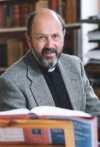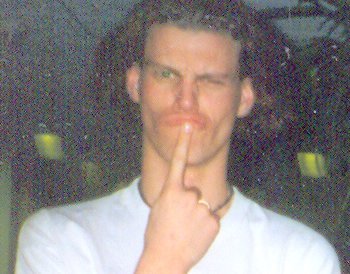Power and the Cross
Perhaps Dr. Wright knows what this blog is about, for he hit it all in this article. In speaking of the Christian response to postmodernity, he articulates what a world without swords looks like, and what it means. I will not do justice to it, even in commentary. I will instead leave you with a few quotes, and highly recommend you read the article in its entirety.
"The Achilles’ heal of modernity is the actuality of evil ... Under God, the role of postmodernity has been to announce the doctrine of the fall to arrogant modernity, and to say, it’s not that easy, guys, you’ve just been building the tower of Babel, and God is coming down to have a little giggle at it and to confuse your languages. "
"Jesus standing in between cynical Pilate and colluding religion, Jesus goes to the cross ... Jesus’ kingship is all about a different way of power, a different way of life, within this present world. And the evidence he gives, that it’s a different sort of kingdom, is that his servants are not fighting. Isn’t that interesting! If it were from this world, my servants would fight to prevent me being handed over. And Jesus’ kingdom is all about bearing witness to truth. And Pilate says, “What is truth?” Pilate’s categories are too small and flat. The only truth Pilate knows is Caesar’s truth, the empire’s truth, the truth of scourging and nails and crosses. Had he been born a millennium and a half later, he would have said, “The only truth I know comes out of the barrel of a gun.” Same kind of thing. And the person who gets let off at the end of the chapter is Barabbas, the violent revolutionary."
"[James and John] know that Jesus is coming to Jerusalem to become king. And so naturally they want to be sitting at his right hand and at his left. And Jesus says, listen, you don’t know what you’re talking about, actually. And they didn’t, of course, because those who end up at Jesus’ right and his left when he comes in his kingdom in Mark and Matthew and Luke are the two who are crucified alongside him. "
"And what is the price if you say no? Here is the center: The price if you say no is the cross. Romans crucified people who resisted empire. Isn’t that interesting! It took genius to see that this symbol, which already had theological and political meaning, because it meant, “We Romans rule the world and if you get in our way Caesar, who is a god, will get you,” and this is what you do. It took genius to see that that symbol could work the other way and be a symbol of the outpoured love of God, and the very redefinition and reconstitution of what power itself was all about. We need to embrace that as the deep meaning and message of the cross if we are to have the genuine Christian challenge in the postmodern world. "
“What would a Christian worldview look like in here? .... [In the University,] we are not studying facts in the abstract as though we’ve got these facts in a test tube or whatever and we can just do things to them and learn them as though they’re over against us. No, the Christian calling is to know the world with a knowledge that approximates to love, and the point about love and the epistemology which love generates is that love both affirms the otherness of the object while remaining in deep, close, and rich subjective relationship to it. Love transcends the objective-subjective divide ... Our vocation, then, is to be agents of new creation, knowing the world and one another with delight and in love and in respect, celebrating it as God’s good creation, grieving over the places where it has gone wrong, glimpsing new creation, not least through the arts and through beauty, and working to make it happen."
"Worship is not simply Christian entertainment or making a miscellaneous nice party with lots of nice music. Christian worship is humbly adoring the Creator God and thereby being renewed in his image. And image-bearing includes that love of the world which shares the love which was Christ’s, which sent him to die on the cross, renewed in his image and strengthened by his body and blood, into a transformative spirituality which expresses itself naturally and obviously in the work for new creation in the world. "
The Christian Challenge in the Postmodern World
Be Blessed, Jeff
Be Blessed, Jeff


0 Comments:
Post a Comment
<< Home